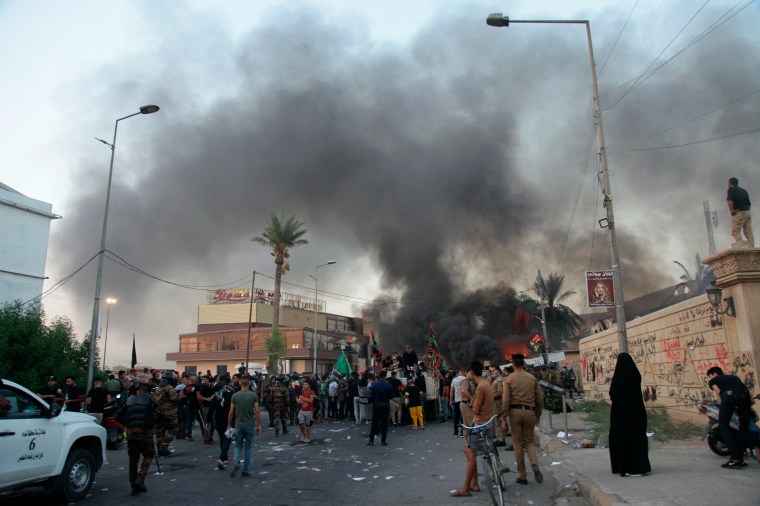New York, September 10, 2020 — Iraqi authorities must investigate the threats against employees of Dijlah TV and do their utmost to ensure they can work freely and without fear of reprisal, the Committee to Protect Journalists said today.
Since August 28, at least six reporters and camera operators working in Iraq for the Jordan-based broadcaster have quit their jobs and gone into hiding amid a campaign of threats for allegedly offending Iraqi Shias, according to a statement issued by the journalists, copies and screenshots of the threats, which CPJ reviewed, and several of the journalists, who communicated with CPJ via messaging app and email.
The threats against the journalists began after Dijlah Tarab, a music broadcaster and an affiliate of Dijlah TV, broadcast a concert during Ashura, a day of mourning for Shia Muslims. In a statement issued on August 30, Dijlah TV blamed the affiliate for broadcasting the concert at an inappropriate time and apologized to those offended.
“Iraqi authorities are utterly failing to protect journalists who are in danger and leaving them to fend for themselves against militias,” said CPJ’s Middle East and North Africa representative Ignacio Miguel Delgado. “Iraqi authorities must launch an investigation into the threats and incitement against the Dijlah TV staff and do their utmost to protect them and ensure that they do not have to live in fear.”
On August 31, Baghdad’s Rusafa Investigative Court issued an arrest warrant for Dijlah TV owner Jamal Karbouli for allegedly insulting Shia Muslims in Iraq by broadcasting the concert, and protesters ransacked the broadcaster’s Baghdad office, as CPJ documented at the time. Karbouli has not been arrested and was posting freely on social media as of today, as seen on his social media accounts.
Several journalists who quit and went into hiding after they received threats asked CPJ not to publish their names, citing fear of reprisal. Those who agreed to share threats they received with CPJ and be identified by name include Al-Diwaniyah-based reporter Ziad al-Fatlawi and camera operator Mohammad al-Bolani, Al-Kut based reporter Ali Mohammad, Najaf-based reporter Karar al-Asaf, Dhi Qar-based reporter Rasem Kareem, and Baghdad reporter Saif Ali.
In their statement, the journalists said they had no connection to Dijlah Tarab or any influence over the broadcaster, and that their resignations have not stopped the threats.
In text messages, social media posts, and threatening photos and videos shared with CPJ, internet users and Facebook groups have disclosed the names of Dijlah TV employees, called for the journalists to be expelled from the governorates where they work, for the broadcaster’s offices in Iraq to be torched and closed, and called on Shia Muslims in Iraq to “make an example” of every Dijlah TV employee they find.
Al-Fatlawi showed CPJ a message he received from an unidentified person that included a photo of his car with the message, “we will get you if you’re in your room” and an emoji depicting a stick of dynamite.
Al-Fatlawi told CPJ that three militiamen tried to attack him on August 31, and he shared CCTV footage with CPJ that depicted three men standing outside Dijlah TV’s office in Al-Diwaniyah.
A Dijlah TV reporter who preferred to remain anonymous, citing fear of reprisal, said that the leader of an Iraqi militia, whose name he declined to disclose for fear of retaliation, told him that he and his colleagues could return from hiding if they apologized to religious authorities and publicly thanked the Popular Mobilization Forces, an Iraqi state-sponsored umbrella group consisting of mainly Shia militias, for their protection.
Al-Asaf told CPJ that he has been receiving death threats on social media and messaging apps from alleged members of militias and the Popular Mobilization Forces.
“I have been forced underground because of the incitement to kill me and because there are people in Najaf who are searching for me in order to kill me,” he said.
CPJ emailed the Iraqi Interior Ministry for comment, but did not receive a response.
